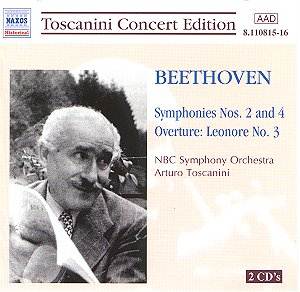
The restoration of these American broadcasts of sixty years ago are welcome.
Their age means that the recordings are not perfect but, my goodness, the
playing is.
Although a confirmed Beethovian, the Symphony No 2 has never been
a favourite of mine largely because of the inane musical theme of the finale
which is like a drunk taking a somersault. Listening to this I was struck
by the similarities of the opening movement with the opening music of the
ninth symphony. After the slow introduction, the allegro con brio
is just that and played with splendid gusto. It was a revelation. The strings
swirl like wild dervishes and the brass punctuation is electrifying. Here
is noble proud music without the pomposity of Edwardian music and where an
allegro is not a slow andante. The introductory adagio
reveals much beauty from Toscanini and his orchestra which beauty I had not
encountered before and the allegro matches the music for quality.
The second movement is a larghetto which is a shade too fast for my
taste but it is played with great elegance. It has a tenderness devoid of
sentimentality. And how Beethoven developed his material rather than just
repeat it over and over again as did Schubert. This movement is happy and,
at this speed, rather playful. Memorable it certainly is. The scherzo
is another happy movement quite at odds with Beethoven's anguish at his deafness.
For Beethoven, life is still worth living despite cruel blows that occur.
Again the speed is a little too fast but the result will please a lot of
people. The conductor is really driving the orchestra.
And so to the finale. Once that silly opening theme is out of the
way, the music develops in a stirring fashion and then that silly theme returns
and after another fine exposition it returns for the third time. Some of
the playing is a little exaggerated but doesn't it build up to a terrific
climax.?
Beethoven's Symphony No 4 is a masterpiece. Berlioz's famous remark
about the slow movement being so beautiful that no mortal man could have
written it is well known. While I have heard it played better there is no
denying the superlative quality of the piece. In the first movement's slow
introduction there are a few quirky mannerisms and the sunny allegro
has better advocates. But this is another performance of commitment and both
the scherzo and finale have a wonderful sense of dash. I have
always regretted Beethoven inserting that short slow passage towards the
end of the finale since, as a consequence, the momentum is lost.
The Leonore No 3 Overture is given a thrilling performance. It is
quite stunning at times. When Beethoven is played like this and not in the
extreme styles of Klemperer and Karajan we are reminded of what a truly great
composer he is. We have such an advocate today in Sir Roger Norrington.
I am not going to 'give stars' for performances and recordings because that
would be difficult bearing in mind the vintage.
All I can say is that Beethoven is a genius and Toscanini a real maestro.
Reviewer
David C.F. Wright
